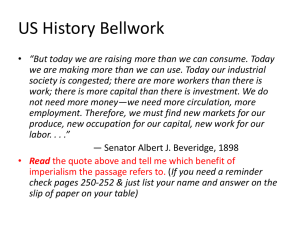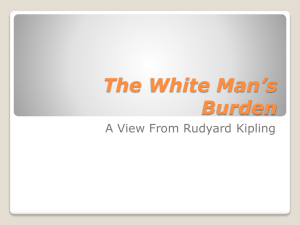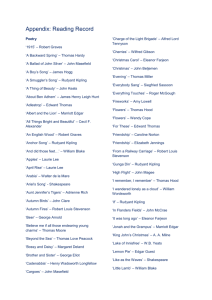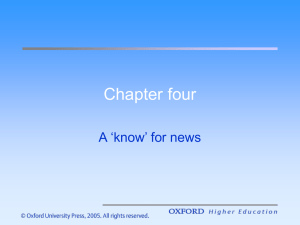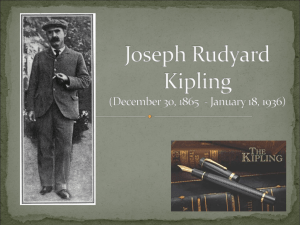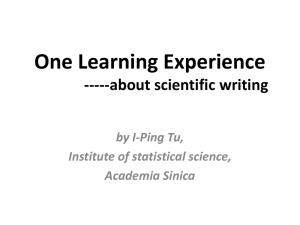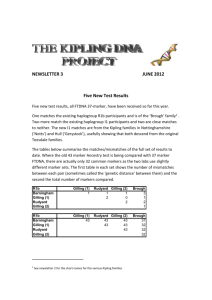Lauren Battista - Easton Public Schools
advertisement
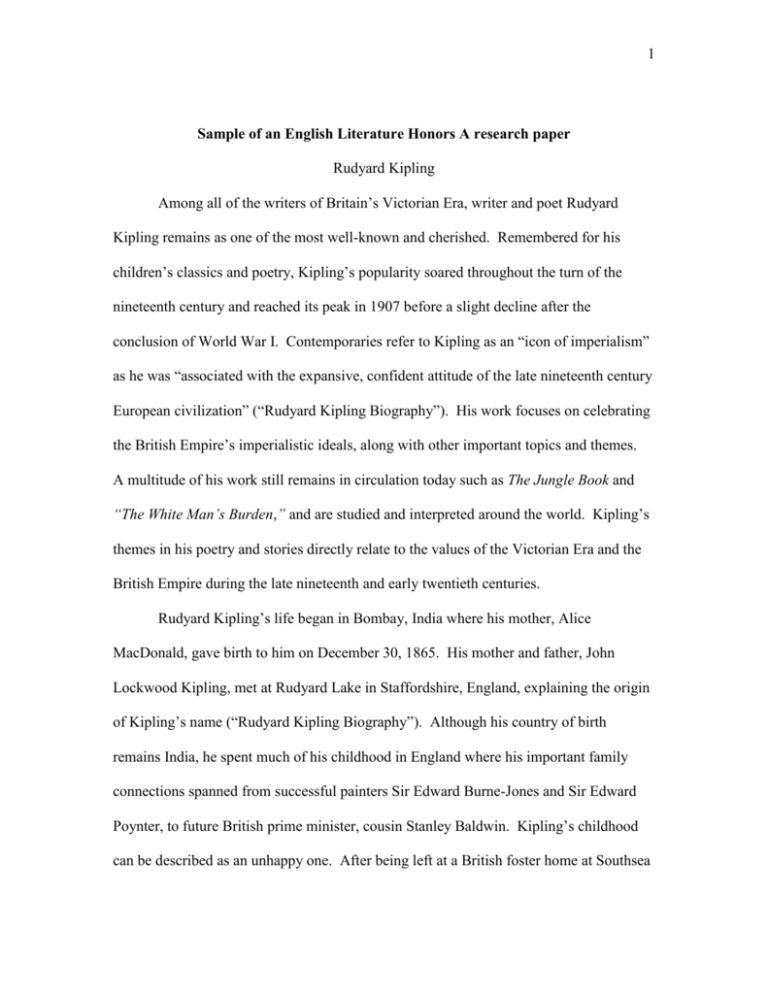
1 Sample of an English Literature Honors A research paper Rudyard Kipling Among all of the writers of Britain’s Victorian Era, writer and poet Rudyard Kipling remains as one of the most well-known and cherished. Remembered for his children’s classics and poetry, Kipling’s popularity soared throughout the turn of the nineteenth century and reached its peak in 1907 before a slight decline after the conclusion of World War I. Contemporaries refer to Kipling as an “icon of imperialism” as he was “associated with the expansive, confident attitude of the late nineteenth century European civilization” (“Rudyard Kipling Biography”). His work focuses on celebrating the British Empire’s imperialistic ideals, along with other important topics and themes. A multitude of his work still remains in circulation today such as The Jungle Book and “The White Man’s Burden,” and are studied and interpreted around the world. Kipling’s themes in his poetry and stories directly relate to the values of the Victorian Era and the British Empire during the late nineteenth and early twentieth centuries. Rudyard Kipling’s life began in Bombay, India where his mother, Alice MacDonald, gave birth to him on December 30, 1865. His mother and father, John Lockwood Kipling, met at Rudyard Lake in Staffordshire, England, explaining the origin of Kipling’s name (“Rudyard Kipling Biography”). Although his country of birth remains India, he spent much of his childhood in England where his important family connections spanned from successful painters Sir Edward Burne-Jones and Sir Edward Poynter, to future British prime minister, cousin Stanley Baldwin. Kipling’s childhood can be described as an unhappy one. After being left at a British foster home at Southsea 2 for five years, Kipling went on to attend the United Services College, an inexpensive boarding school. The horrific experiences Kipling had during his childhood were channeled through several of Kipling’s stories, including Baa Baa Black Sheep and Stalky & Co. (“Rudyard Kipling…”) Kipling’s fictional work, Stalky & Co., connects directly to life in the Victorian Age through its themes and characters. As an author, Kipling incorporated his childhood experiences into this particular novel to “celebrate the ingenious and crafty hero, working with others in a vividly realized situation to do his job” (Quigley). Unlike other traditional heroes, who tended to die, from other works of contemporary literature, Kipling’s new idea of a hero survived in his novels, proving that “Kipling’s were more useful to the Empire” (Quigley). Stalky & Co. also integrates Kipling’s imperialistic beliefs because the main character, Stalky, needed an imperial environment, in which “a man needs devoted followers, childlike admirers to whom he seems godlike, unquestionably right” (Quigley). This necessity also existed in the British Empire, where citizens felt they were godlike and superior to other races and ethnicities, and needed to pass the teachings of their civilization onto the less privileged countries, proven through Charles Darwin’s theory of Social Darwinism. What makes Stalky & Co. different from Kipling’s other novels is the “light heartedly” but “serious” manner in which Kipling directed the themes towards the reader. In modern society, readers face a dilemma, as the accepted values of the Victorian Age seem outrageous to current moral standards. However, “in the moral life of history, there are apparently no gains without losses,” and “few books urge the reader to confront this contradiction more barely and boldly than Stalky & Co.” (Gilbert 152). 3 Trying to escape the horrors of his childhood, Rudyard Kipling traveled back to India where his parents still resided. There, he began working as a newspaper editor and journalist, and began to experiment with poetry before 1883, the year he became a well known poet. (“Rudyard Kipling Biography”) His writing career initiated in India with the publication of six short story books, including The Phantom Rickshaw and Wee Willie Winkie. His fame from his stories spread around the globe before Kipling traveled himself, and when he settled back in England, he soon became known as “one of the most brilliant prose writers of his time.” (“Rudyard Kipling…”) As he published novels such as The Light that Failed, and his most famous poem of that time, “The Ballad of East and West” his popularity continued to soar. As his collections of numerous novels and poems grew, Kipling became known as “the literary voice most closely associated with the imperialist tempo” of the nineteenth century United Kingdom (“Rudyard Kipling Biography”). All aspects of Kipling’s life connected to British imperialistic ideals, which resulted in his popularity as an “icon of imperialism” (“Rudyard Kipling Biography”). The opening stanza of Kipling’s poem, “The Ballad of East and West, states that “East is East, and West is West, and never the twain shall meet,” however; Kipling’s personal experiences while living both in the east and the west significantly influenced him equally (Kipling 1). While living in India, Kipling formed a foundation of knowledge which helped him create his opinion on British imperialism once he settled in the west. In contradiction to Kipling’s poem, the East and West would someday meet if the British Empire’s mission of imperialism succeeded and the British spread their cultural, social, and economic influence to the western countries. Both the east and west lifestyles served 4 an importance to Kipling, as “many of Kipling’s creative works are influenced by Eastern philosophy and mysticism,” and his experience in Britain occurred as the “British Empire was at its zenith” (Embar). Following his rise as a novelist and poet, Kipling married Caroline Balastier, and the newlyweds resided in Vermont, but were not able to adjust to the American way of life. During his stay in America, Kipling turned his attention to composing children’s stories. In 1894, Kipling published The Jungle Book, his most memorable work, which is a collection of children’s stories linked together by poems (“Rudyard Kipling Biography”). Although considered a children’s novel, Kipling’s The Jungle Book covers themes appropriate to both adults and children alike. The collection of stories displays how much Kipling has been “influenced by British imperialism and their prejudices” (“The Jungle Book…”). The seven stories composing the novel take place in many different parts of the world, both wealthy and underprivileged, where Kipling presents life in all different forms, although each location was a British colony (Safier 705). Even though Kipling does stay true to his imperialistic ways in the short stories, he also “spreads a message through the central characters that although humans have the capability to be evil, an innate goodness lies within everyone” to develop values such as order and wisdom (“The Jungle Book…”). In comparison to the animals, which serve as main characters of The Jungle Book, humans have the power to choose between good and evil. This concept justifies why Kipling believes that the British Empire should continue in spreading their superior qualities to the lesser countries that have not built up quality values of their own. 5 Upon the Kipling’s return to England in 1896, Rudyard was reassured of his proposition that “only lesser breeds are born beyond the English Channel.” (“Rudyard Kipling…”) The years following his return to England, Kipling befriended British Imperialist and South African statesman Cecil Rhodes, and the two became symbols of imperialism. During this time, Kipling continued to publish successful novels such as children’s classic Kim in 1902 as well as Captain’s Courageous. He also produced his most famous poem, “The White Man’s Burden” during this span (“Rudyard Kipling Biography”). Kipling’s dedication to the British Empire and imperialism was vital to his success as a poet and novelist. Throughout his poetry, the British Empire “assumed a complex mythical or legendary function” which in return became passed on to his readers. (Cody) For example, in his notorious poem, “The White Man’s Burden”, Kipling creates a complex symbol for imperialism as the burden of all citizens of the Empire (Cody). The poem directed its attention towards the United States, as Kipling urged the United States to take up the “burden of empire, as had Britain and other European nations” (“The White Man’s Burden…”). His commitment to imperialism defined Kipling as a writer and created a unity in his work; however, it limited his perspective to anything outside of the British Empire. Kipling only knew of life inside the rule of Britain, since he lived both in England and the British colony of India for his lifetime, which gave him personal experience with imperialism from both sides of the spectrum (Rhoswen). Due to Kipling’s different experiences, his view of imperialism was “predicated on deeply held political, racial, moral, and religious beliefs which sustained a 6 feeling of innate British superiority” (Cody). The first lines of “The White Man’s Burden” display Kipling’s strong belief in the superiority of certain ethnicities: Take up the White Man’s Burden Send forth Ye best breed— Go send your sons to exile To serve your captive need (“The White Man’s Burden…”) Through this selection from the poem, Kipling tells the United States to spread their control over less civilized and less successful countries. As a result for their endeavors, Kipling believes that in the end, the United States will gain more power and a greater sense of recognition from other countries as a superior nation. In Victorian society, in addition to imperialism, religion remained above all in utmost importance. The church and the state were to be kept as a single unit, and Kipling had strong religious influence from his family during his childhood. However, as time progressed, the influence of religion began to decline as the British Empire grew. As a poet, Kipling continued to emphasize the importance of religion. Specific poems such as “Recessional” and “If-” illustrate a striking resemblance to Protestant hymns. Kipling utilizes religious vocabulary which, without prior knowledge of this language, could be determined just through the “musical hymn-like nature” of the poems. (Rhoswen) Through his poetry, Kipling conveys a message that “associates Britain’s achievements with God, saying that it was through God’s divine help that they were able to achieve all that they did.” (Rhoswen) Rudyard Kipling functioned as a driving force to bring religion back into the society that began to forget about the God that stimulated their excellence. Even though nationwide fame existed throughout his career, Rudyard Kipling’s popularity did not peak until the early twentieth century. This plateau occurred in 1907 7 when Kipling was awarded the Nobel Peace Prize in literature as the first ever Englishman to be honored. Kipling and his wife settled down in a home at Burwash, Sussex which remained his final location until his death (“Rudyard Kipling…”). In Kipling’s later life, he continued to write poems and children’s stories but with lessened success. Towards the end of Kipling’s career, the recurring theme that made him an icon in literature also led to his downfall among British popularity. At first, many shared Kipling’s desire and passion for British imperialism, but as major changes occurred throughout Britain and Europe and World War I instigated, imperialistic ideals began to become outdated and detested. Before the start of World War I, jingoism, or excessive patriotism, covered the minds of people living in Britain, and Rudyard Kipling himself was not even considered the “most rabid of the jingoes” compared to the rest of the British population (Cody). In regards to all other “jingoes”, Kipling remained an outsider who wrote his poems and novels to serve as the “interpreter, propagandist, and chief apologist of the Imperialistic elite” to both those who supported democracy or liberal ideals (Cody). Kipling believed that World War I would stand in the way of Britain’s task of civilizing colonies around the world and would be a threat to the British Empire, a belief that would prove to be the truth. His expansive, confident attitude of the British and European Empire became out of date when the ideas of communism arose, and the European colonial empires collapsed. Kipling remained true to his original imperialistic beliefs even after the conclusion of the war, which caused his reputation to suffer as he became better known as a “jingoistic imperialist” (“Rudyard Kipling…”). The novel, Mary Postgate, displays the true complexity of Kipling’s work in regards to being able to symbolize the affects of 8 World War I on British society through the main character Mary’s journey. (Cody) A multifaceted novel, Mary Postgate can be interpreted in several ways. The most common interpretation considers the novel a propaganda piece during World War I which discusses “the consequences of death not only of humans but of dreams.” (“Mary Postgate…”) Kipling wrote the novel during a time when German bombing raids began occurring on English towns and massacres erupted in France. The novel served a purpose to inspire the British to gain courage and defeat the Germans whom conceivably were considered “animals who have scientifically and philosophically removed themselves inconceivably outside civilization”. (“Mary Postgate…”) Although imperialistic work became less accepted after World War I, since many parts of the world turned towards accepting the new Communist ideals, Kipling’s Mary Postgate served as a predecessor of modernist works and contains all of the themes which Kipling prided himself on during his career. In conclusion, Kipling’s decline as a popular novelist and poet can be attributed to political prejudice of the early twentieth century, and Kipling will forever be remembered as one of the greats in Victorian literature. On January 18, 1936, Rudyard Kipling died of a brain hemorrhage in England. Posthumously, Kipling and his work began to be criticized although most who condemn him are actually “criticizing the imperialist ideal, rather than Kipling himself” (“Rudyard Kipling Biography”). Kipling is placed among the elite writers of the Victorian Age, and his numerous novels, poems, and children’s stories continue to be cherished and considered among the best in British literature. 9 Work Cited Cody, David. "Kipling's Imperialism." The Victorian Web: An Overview. 1988. Web. 20 Sept. 2009. <http://www.victorianweb.org/authors/kipling/rkimperialism.html>. Embar, Ravi. "Poetry Analysis: If, by Rudyard Kipling." Helium. Web. 5 Oct. 2009. <http://www.helium.com/items/987621-poetry-analysis-if-by-rudyard-kipling>. Gilbert, Elliot. Kipling and the Critics. New York, 1965. Print. Kipling, Rudyard. The Ballad of East and West. Read Print. Web. 7 Oct. 2009. <http://www.readprint.com/work-962/The-Ballad-Of-East-And-West-RudyardKipling>. "Mary Postgate" An Introduction." The Victorian Web: An Overview. 1988. Web. 01 Oct. 2009. <http://www.victorianweb.org/authors/kipling/postgate.intro.html>. Quigley, Isabel. "Stalky & Co. Introduction." Kipling Society homepage. Web. 07 Oct. 2009. <http://www.kipling.org.uk/rg_stalky_intro_p.htm>. Rhoswen, Genna. "Poetry of Rudyard Kipling: Themes of Imperialism/Colonialism and Religion, Page 2 of 2 -." Associated Content. 22 Aug. 2009. Web. 20 Sept. 2009. <http://www.associatedcontent.com/article/>. "Rudyard Kipling Biography." Biography Base Home. Web. 20 Sept. 2009. <http://www.biographybase.com/biography/Kipling_Rudyard.html>. "Rudyard Kipling (British writer)." Encyclopedia - Britannica Online Encyclopedia. Britannica Online Encyclopedia. Web. 20 Sept. 2009. <http://www.britannica.com/EBchecked/topic/318987/Rudyard-Kipling>. Safier. "Rudyard Kipling." Adventures in English Literature, Pegasus Edition. New York: Harcourt Brace Jovanovich, 1983. 705. Print. 10 "The Jungle Book Study Guide by Rudyard Kipling: Social Sensitivity Study Guide." BookRags.com. Web. 30 Sept. 2009. <http://www.bookrags.com/studyguidejungle-book/socialsensitivity.html>. ""The White Man's Burden": Kipling's Hymn to U.S. Imperialism." History Matters: The U.S. Survey Course on the Web. Web. 07 Oct. 2009. <http://historymatters.gmu.edu/d/5478/>.

